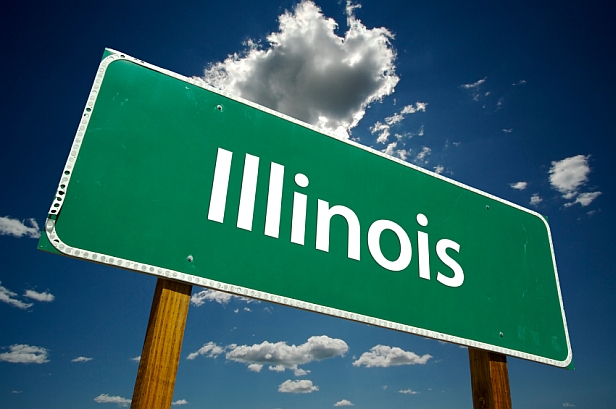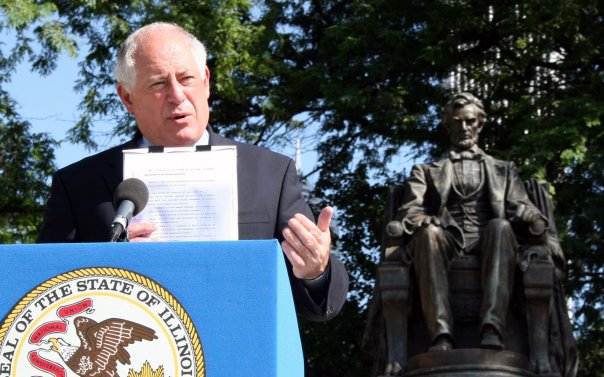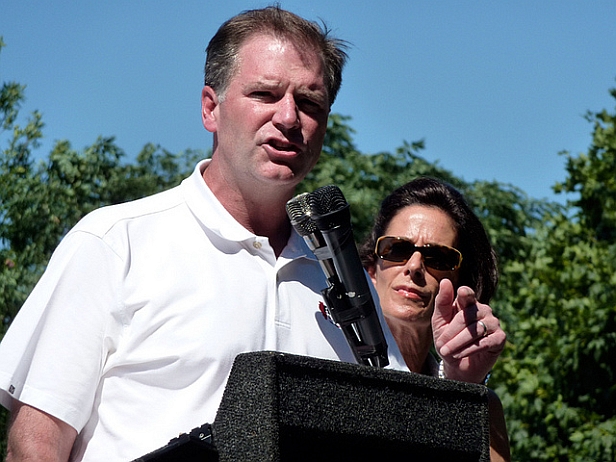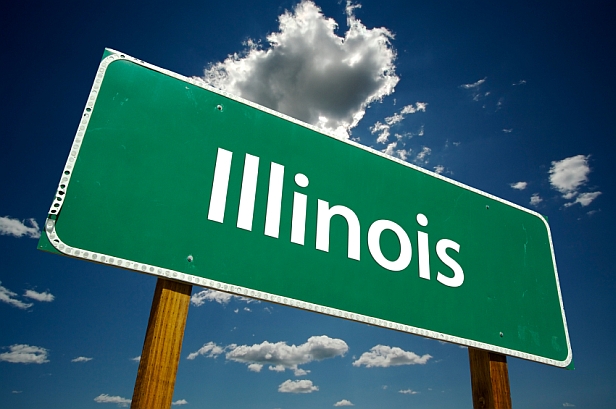 The two most influential characters in the Illinois governor race aren’t even running for office. The clownish specter of impeached ex-Gov. Rod Blagojevich (D) hangs over the race as his legal troubles unfold. And Chicago Mayor Richard M. Daley’s (D) surprise retirement announcement has set off a tizzy of speculation about who will run to be the city’s first new leader in 20 years, threatening to suck up attention and contribution dollars from the less glamorous governor’s race.
The two most influential characters in the Illinois governor race aren’t even running for office. The clownish specter of impeached ex-Gov. Rod Blagojevich (D) hangs over the race as his legal troubles unfold. And Chicago Mayor Richard M. Daley’s (D) surprise retirement announcement has set off a tizzy of speculation about who will run to be the city’s first new leader in 20 years, threatening to suck up attention and contribution dollars from the less glamorous governor’s race.
Gov. Patrick Quinn (D), Blagojevich’s unassuming replacement, will need to distinguish himself from these two figures if he’s going to fend off State Sen. Bill Brady (R), a downstate developer hoping to ride a wave of public frustration into higher office.
Quinn inherited a $4 billion budget deficit and a 9 percent unemployment rate when he took over from Blagojevich in early 2009. Yet he may be ideologically more closely aligned with the state than Brady, a Tea Party–backed candidate who denies human-caused climate change and spoke in April about the need to return to “John Wayne’s America.” (Presumably he was stressing rugged individualism and not vigilante crime-fighting or horseback transportation.)
Quinn has built up a record, both as governor and earlier in his career, of nurturing clean-energy business growth and protecting consumers from utility rate hikes. Last year, he rallied Midwest governors in support of a regional high-speed rail network, which paid off in $2.6 billion in federal stimulus grants, making the Chicago-based network a top recipient in the nation. Plenty of states asked for high-speed rail money, but Quinn made his bid successful by having Illinois provide matching funds, according to Jack Darin of the state Sierra Club chapter. Brady, in contrast, voted against the rail package.
The challenge for Quinn will be getting voters to notice all of this amid the budget crisis and the post-Daley drama.
Patrick Quinn
 Gov. Quinn signing an ethics bill last year.During his time as lieutenant governor, from 2003 to 2009, Quinn supported the growth of the state’s cleantech industry, helping to make Chicago a hub for Midwest wind companies. He backed the state’s 2007 law requiring 25 percent of electricity to come from renewable sources by 2025, one of the strongest standards in the nation.
Gov. Quinn signing an ethics bill last year.During his time as lieutenant governor, from 2003 to 2009, Quinn supported the growth of the state’s cleantech industry, helping to make Chicago a hub for Midwest wind companies. He backed the state’s 2007 law requiring 25 percent of electricity to come from renewable sources by 2025, one of the strongest standards in the nation.
This year, as governor, Quinn signed a law to amend that renewable standard by requiring a portion of the power to come from solar panels, an attempt to jump-start the state’s solar industry. “All of this is key to our economy,” he said at an August signing ceremony. “These jobs do not get exported to another country. They stay in our backyard.”
State environmentalists say their next legislative target is improving the net metering law to make it profitable for businesses and property owners to install large rooftop solar arrays (current law caps the amount of power they can sell back to utilities at retail rates). They expect Quinn to be more supportive than Brady.
Quinn successfully fought a proposed coal strip mine in the Illinois River valley, although, in a coal-rich state, he hasn’t shown an inclination to fully oppose the dirtiest of fossil fuels.
He signed an order requiring state facilities to cut their energy use, including state colleges and the Illinois Tollway network. Quinn’s focus on efficiency dates back to 1983, when he helped create the Citizens Utility Board, a ratepayers’ advocacy group.
The governor has limited control over land use and metro Chicago’s infamous sprawl, but Quinn took one notable step by requiring state agencies to consider housing and transportation costs together in planning decisions. The first-in-the-nation policy draws off the work of Chicago’s Center for Neighborhood Technology (CNT) and encourages walkable urbanism by factoring in the lower transportation costs of compact areas.
Quinn has appointed CNT staffers to economic recovery commissions and has pleased environmentalists with his consumer-friendly appointments to the powerful Illinois Commerce Commission, a utility regulator.
Pat Quinn “is a thoughtful, smart, green governor,” said Howard Learner, president of the Environmental Law and Policy Center and a former Obama campaign advisor. “Not just because of something he’s done now, but for what he’s done throughout his career … On the other hand, he has a state that’s in a budget crisis.”
Bill Brady
 State Sen. BradyJkarsh via FlickrThat budget crisis, and Quinn’s struggle to resolve it, are key reasons that Brady has been leading by several points in recent polls. Since taking a lead, he’s avoided provocative “John Wayne” statements.
State Sen. BradyJkarsh via FlickrThat budget crisis, and Quinn’s struggle to resolve it, are key reasons that Brady has been leading by several points in recent polls. Since taking a lead, he’s avoided provocative “John Wayne” statements.
Brady voted against state funding for high-speed rail and against a 2008 bill that shored up underfunded regional transit systems. But he hasn’t criticized federal investment (as conservatives elsewhere have done), and he speaks in support of maintaining “modern infrastructure.”
Brady, who has worked in his family’s home construction company, is unlikely to curb sprawl or question auto-centric housing models. He sided with developers in voting against a flood-plain development limit, and he advocates repealing the state gas tax.
“I have never known him to be supportive of anything that is innovative or progressive or that really changes the status quo,” said CNT’s Jacky Grimshaw (who Gov. Quinn appointed to the Chicago Transit Authority board).
Learner said many statehouse Republicans are willing to work with environmental groups, but Brady typically isn’t one of them. Another environmentalist said he worried Brady would take a hard-line stance against environmental regulation and appoint like-minded people to regulatory boards.
On energy, Brady’s website pledges to “maximize the use of Illinois’ coal through new clean coal technologies.” “Clean coal” has never been commercially viable, though Illinois is home to both the revamped federal FutureGen carbon capture and sequestration (CCS) project and the proposed Tenaska CCS
coal plant.
Brady’s site gives a nod to other energy sources, saying he will “maximize all state energy opportunities to increase usage and capacity for our abundant natural gas, wind, oil, nuclear, coal, solar, ethanol, and biofuels.”
The Sierra Club’s Darin doesn’t buy it, noting that Brady voted against the renewable standard that has been so instrumental in promoting clean energy in the state.
“We have a very real reason to believe this momentum toward a clean energy future would halt or even reverse if Bill Brady were governor,” he said.
——–
Green Party candidate Rich Whitney is also in the race, polling at 4 percent — which could be enough to cause problems for Quinn if the race tightens up.
Update: As commenters note, Whitney pulled in 10 percent of votes in the 2006 governor race, attracting nearly as many self-identified Republicans (7 percent of his supporters, according to an exit poll) as Democrats (8 percent). So it’s not clear that he’ll take more votes from Quinn than from Brady.
Do you know more about this race? Tell us in comments below. And find out about other races in our Gubernatorial Tutorial special series.



